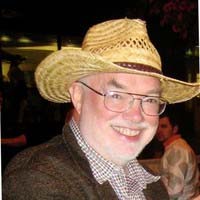
After a career in computing in Scotland and the USA Oscar retired to St Hilary, where he lived with his mother, Jeannie, at Little Hall Cottage. He passed away on 16 December 2020.
This story of Oscar’s life is based on the eulogy written by his lifelong friend, Jim Hindmarsh which was read at a service to mark Oscar’s life at St Brides-super-Ely Church on 24 February 2021. It is followed by the story of his mother, Jeannie Griffiths, his father, Oscar Ackerman (Senior) who died on active duty before Oscar (Junior) was born and Judith Ackerman, his former wife.
*************************************************************************
Oscar's Eulogy (24 February 2021)
Standing here today we cannot help but think of Oscar’s father who was killed in the Second World War a month before Oscar was born and of Jeannie his mother.
We first met about seventy years ago at the Llandaff Cathedral School where Oscar was a chorister, but any picture you may have of an angelic choir boy would be misleading. When I picture him as a schoolboy I see a naughty little boy’s cheeky grin and in my eyes it was a look he never lost throughout his life, an eager look which said ‘what mischief can I get up to next?’ This picture was confirmed by someone, who was also in school with Oscar, in the same class and, as far as I know, has not met Oscar since their schooldays. He remembered Oscar at once. His immediate response was to refer to ’bad boy Ackerman’. He went on to say Oscar was no teacher’s pet, but was the bête noir of the class, so much so that one of the teachers pinned up a drawing of Oscar hanging from a gallows waiting to fall into hell below. Teachers would not be allowed such pleasures today.
After Llandaff we lost touch in our teens so my next memory is working on a farm together at some point in the mid-1960s. This farm was in Saint Georges super Ely, a mile or so away. The lovely old farm is still there. There were just the two of us helping an elderly farmer whose land straddled the main railway line. It was a summer job for both of us and, like all summers of the past, the days were sunny from dawn to dusk.
After leaving school, and a time at the Welsh College of Advanced Technology, the Welsh CAT, Oscar went to work in Cumbernauld. He worked with computers and continued to do so for most of his working life. Sometime in the mid-1970s he moved to the United States where I visited him in 1979. I first set foot in the United States, arriving at night by bus in a dingy Detroit bus station after a crossing from Canada. It was full of the strange characters who are drawn to such places, one of whom I was relieved to see was Oscar.
At the time he was living In Ann Arbor, about forty miles west of Detroit, in a flat overlooking railway tracks which he referred to as his model railway. We visited a variety of bars and restaurants and went to see ‘Star Wars’ which had been recently released.
By this time Oscar had learnt to fly, obtained a pilot’s licence and bought a share in a four seater Piper aircraft. We flew from Ann Arbor up the shores of Lake Michigan to Sault Saint Marie, or Canadian Sue as it is known on the Canadian side of the border. He told me the three great irrelevances of flying, the sky above you, the fuel you have used and the runway behind you, all to stress what is important. Words which make one wonder, what are the three great irrelevances of life?
In some ways Oscar might be described as a risk taker, prepared to do the unusual, the forbidden or, when younger, the naughty, but when it came to flying he was, uncharacteristically, very careful and took no risks at all.
Oscar had by that time met Judy his wife. Although they later divorced they stayed in touch, especially in the last months of her life.
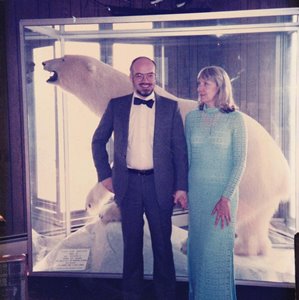 |
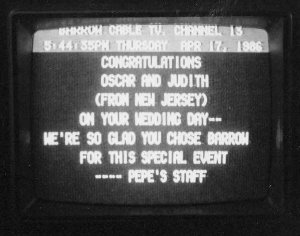 |
He was now working for the Boroughs Corporation and continued to do so until 1995 when he set up his own computer consultancy with the name ‘Forty Acres and a Mule’. He explained to me that the phrase "Forty Acres and a Mule" came from a promise many formerly enslaved people believed the US government had made at the end of the Civil War. Oscar felt he too had been released from slavery.
Sometime around the beginning of the new century Oscar briefly became interested in being an estate agent or realtor as they say over there. More importantly he was now living in Somerville, a small town near Princeton and less than forty miles from New York. This meant he could attend meetings of a group of people devoted to the works of James Joyce. Typically they might spend a whole evening discussing one page of say Finnegan’s Wake, on a really good evening maybe just half a page! Oscar’s enthusiasm for Joyce grew and on his return to the UK, as well as on earlier visits, he went to Dublin, taking Jeannie with him, for several Bloomsdays on 16th June, to join the celebrations. Participants dress up as characters from Joyce’s novel Ulysses and walk the steps of the central character Leopold Bloom. Naturally this appealed to Oscar immensely.
I mentioned earlier that Oscar’s flat in Ann Arbor overlooking what he called his model railway or train set. There were two other railway days we had together, both instigated by Oscar. One was to walk the route of the Trevithick railway between Merthyr and Abercynon. It was on this walk, whilst stopping for lunch at a pub in Aberfan, I learnt of Oscar’s love of engaging complete strangers in conversation. He would talk to anyone! In this case a drunk who kept placing bets on horse races and losing. Another expedition was to see what was left of a railway tunnel through the hills to the west of Aberdare. He found it, but it was completely bricked up.
Oscar liked cooking. He entertained well and his food was always tasty, served in the dining room at Little Hall Cottage, the garden or even the yurt he once had in his garden. Perhaps his greatest contribution to Saint Hilary cuisine was to form the Saint Hilary Tripe and Onions Society!
He was generous and capable of extravagance, on his last night in America he went out to eat in a restaurant where he paid almost $300 for a bottle of wine.
After leaving America he came back to Saint Hilary to live with, and look after, his mother Jeannie. He did this without question and I am sure it must have been very difficult at times but he was determined she should not leave her home.
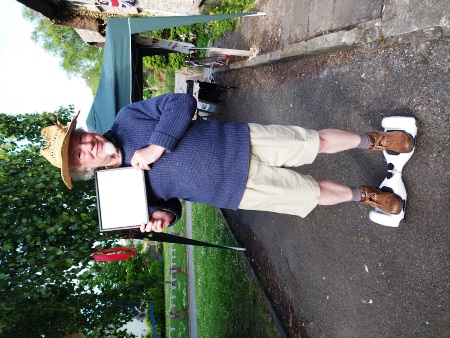
Life in the village suited him well, he liked the church, he liked The Bush and he liked village life. In turn I believe the village appreciated him for adding colour and eccentricity, an eccentricity which was perhaps the remains of childhood naughtiness, a willingness to gently break the rules. People have told me about his many hats, the straw hat, cycle helmet, and bobble hat, about his bow ties, his Segway, putting out the flags on VE day and dressing up as an Arab. There must be many more such memories and it is such a shame we cannot now set off to The Bush to reminisce and celebrate his life together. Perhaps we will be able to do this sometime in the summer.
Jim Hindmarsh, February 2021
Oscar’s Mother: Jeannie Griffiths (1924 – 2017)
Barbara Jean Simpson’s family were originally from Leeds but moved to Blackpool where they ran a bed and breakfast.
Oscar’s father, Oscar Ackerman (Senior) billeted with them when he undertook his basic military training in Lancashire. Jeannie, then 17 years of age, was no doubt impressed by the handsome and worldly young airman – particularly when he managed to procure tickets for her to see her idol perform in Manchester – the by then famous Margot Fonteyn.
After his basic military induction Oscar (Senior) had many postings and was shot down (see below). They stayed in touch through frequent letters and married in November 1942 at the village of St Brides-super-Ely. The couple visited London for their honeymoon, staying at the Waldorf hotel on the Strand.
After he recovered Oscar was posted to RAF Wing Training Aerodrome to train new recruits. Jeannie was able to find work in a nearby munitions factory, packing parachutes for flares. They shared a bedsit in nearby Lindslade, a suburb of Leighton Buzzard. When, in 1943, Oscar was posted to RAF Cark in Cumbria Jeannie moved back to her mother’s home in Blackpool, which was conveniently close for Oscar to visit at weekend or on leave days.
In the autumn of 1943 Jeannie became pregnant.
In March 1944, Oscar went on a training flight. In stormy weather with poor visibility Oscar’s Anson collided with another training aircraft and ditched in the Mull of Galloway. This time there were no survivors.
Six weeks later her child was born – a son. She named him Oscar George Ackerman after his father.
Jeannie and her baby son survived the war, and later were invited to go and live in California with Oscar’s aunt Amelia, where they were spared the austerity of life in Britain.
Jeannie eventually returned to Glamorganshire and remarried in 1960 to Reg Griffiths. She and Reg lived in St Hilary which is just a few miles from St Brides. Jeannie retrained as a radiographer and worked at Velindre Hospital in Cardiff.
Reginald Griffiths passed away in 1973. He is buried in St Hilary church grounds. He was a retired bank official.
Jeannie was involved in the organisation of many village celebrations, notably St Hilary 900 and St Hilary 2000. Jeannie died in 2017, aged 93.
She was the mother of Oscar Ackerman (died 2020) who organised a marvellous 90th birthday celebration for his mother.
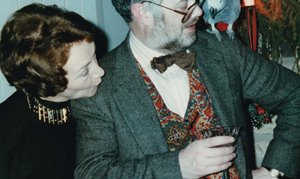 |
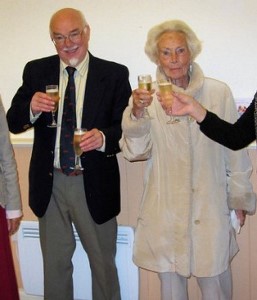 |
|
| Jeannie with Les Parsons, Postman |
Jeannie at Velindre Hospital |
|
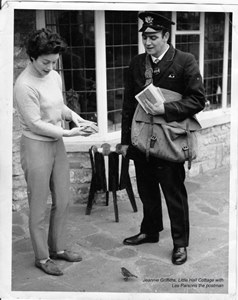 |
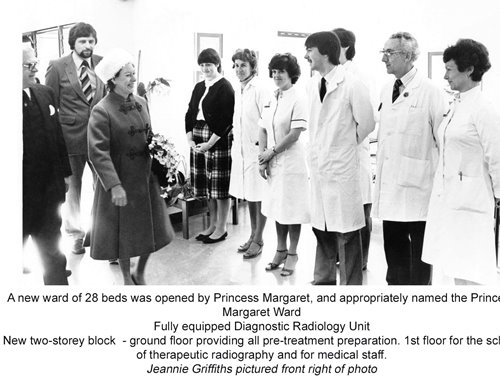 |
There was an amusing story relayed by a neighbour about the time when Jeannie’s handbag had been stolen. When she went to the police station the police officer asked if she could provide a description of the handbag. Jeannie’s response was that it was the same as the Queen’s!
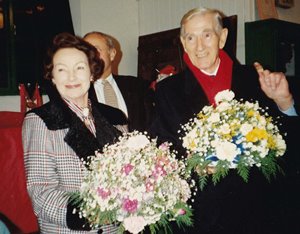
Jeannie with Bob Brierly of Kninkin at a St Hilary 900 event (1990)
Jeannie passed away in 2017, aged 93.
Oscar’s Wife: Judith Ackeman (1941 – 2013)
Oscar married Judith in April 1986. Judith died on 27 February 2013, leaving a daughter, Oscar’s step-daughter. This is her obituary.
Judith Gail Davis Ackerman, age 71 of Sanford, died on Wednesday 27 February 2013 at Central Carolina Hospital in Sanford. She was born on 8 October 1941 in Whitesville, West Virginia, daughter of the late Robert Willis Davis and Laura Alice Hensley Davis.
She was a graduate of Big Creek High School in War, West Virginia and retired from Bell Telephone. She completed college courses in English Literature at the University of Maryland, Rutgers University and Central Carolina Community College.
She loved English Literature and was an avid composer of poetry with poems published in the Red Clay Review. She loved animals and was a supporter of CARA.
Surviving are her husband Oscar Ackerman of St. Hilary, Wales and Daughter Roberta Lynn Dougherty of Hamden, Connecticut.
Oscar’s Father: Oscar George Ackerman (1913 - 1944)
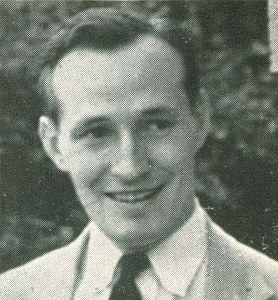
Oscar George Ackerman was a flight sergeant with the RAF Volunteer Reserve (1381575) and a wireless operator/air gunner. He was lost in an aircraft on 5 March 1944, age 31. He was the son of Gilbert Oscar and Emilie Ackerman. His War Grave is in St Bride Church burial ground, St Brides Super Ely, Wales.
The following account of his life was written by his son, also named Oscar.
Oscar George Ackerman was born in Shanghai - the newly established Republic of China - on 1 March 1913. This was shortly after the 1911 Xinhai Revolution that overthrew the last imperial (Qing) Dynasty. His father, Gilbert Oscar Ackerman (born 1881) from Cardiff, who was an accountant had previously emigrated to China to work for British American Tobacco Company. There, Gilbert met Oscar’s mother, Amelia Novak, also from South Wales and her daughter Anne (born 1906) from a previous marriage.
When Oscar was six years old (1919) he was sent back to England to board at a prep school in Bexhill. Since the journey from China took several weeks by mail-steamer Oscar could not return regularly. Instead he spent his holidays with a family friend in Glamorganshire. ‘Uncle’ Tom had a farm in Pentrebane, near St Fagans, Cardiff.
China and Manturia
After finishing 6th form in 1931, Oscar returned to China just after his father died. He followed his father into the tobacco trade and was posted to a factory in Manchuris – at that time a partly Russian populated area, that was occupied by the puppet emperor of the Japanese military of the 2nd Sino-Japanese war. He worked as a factory overseer in the Lee Soong Tobacco Company, a subsidiary of the British American Tobacco Company.
One of Oscars half-sisters was a keen ballet dancer and attended ballet classes with another student, Margaret Hookam when she came to China in 1927. Margaret was hugely talented and subsequently joined the Royal Ballet back in the UK, where she adopted the professional name Margot Fonteyn. Oscar’s acquaintance with Margaret through his sister later played a small but significant part in the direction that his life took.
Return to England
In 1939 the war finally broke out in Europe. Many Europeans in Shanghai left as the conflict between China and Japan intensified.
In October 1940 Oscar, then aged 26, enlisted with the RAF (no1381575) and was posted to Blackpool to undertake his basic military training. He was billeted with a family called Simpson, originally from Leeds. His landlady’s daughter, Barbara Jean, then 17 years of age was no doubt impressed by the handsome and worldly young airman – particularly when he managed to procure tickets for her to see her idol perform in Manchester – the by then famous Margot Fonteyn.
After his basic military induction Oscar was sent to RAF Moreton-in- Marsh in the Cotswolds – one of the many flight training stations for crew serving on the RAF’s fleet of Vickers Armstrong Wellington bombers. He trained as a wireless operator/air gunner – responsible for communications and defending the aircraft from enemy fighters. Oscar and Barbara Jean stayed in touch through frequent letters.
Active service in Egypt
In 1941 Oscar joined 40 Squadron of Wellington bombers, based in Egypt which undertook regular night raids over the western desert – targeting Panzer divisions and ports such as Benghazi in order to weaken Rommel’s supply lines and prevent the fall of Tobruk. It was dangerous and exhausting work, relieved by the camaraderie and tom foolery of airbase life.
By July 1942 Oscar had completed 30 operational missions – the quota for airmen – and was entitled to return to Britain for leave. As he waited to depart on board a warship in Alexandria news came through of a major German offensive – the first battle of El Alemain had started. Oscar was immediately recalled to Cairo and assigned to the crew of another Wellington squadron.
On their first mission disaster struck; the aircraft was hit and caught fire. Oscar and his crew bailed out but he was the only survivor.
Landing behind enemy lines Oscar spent several days in the desert without food or water before being found and picked up by Allied Special Forces. He was then returned to Cairo.
By surviving a parachute assisted escape from a disabled plane Oscar automatically became a member of the exclusive ‘Caterpillar Club’ – an award created by the Irvin Parachute Company.
Convalescence and Marriage
After recuperating Oscar was given leave to return to England in August 1942. He travelled via Portugal (officially a neutral territory). So the British Consulate arranged a ‘fake’ civilian passport for him, as military would be interned. His convalescence took place in Matlock, Derbyshire. And finally, a reunion with his Barbara Jean. Their marriage followed within a few months (November 1942) at the village of St Brides that Oscar knew so well from his childhood. His step-mother and step-sisters living in Cardiff were there, along with his new in laws from Blackpool. The couple visited London for their honeymoon, staying at the Waldorf hotel on the Strand.
Life and Death
After he recovered Oscar was posted to RAF Wing Training Aerodrome to train new recruits. Barbara was able to find work in a nearby munitions factory, packing parachutes for flares. They shared a bedsit in nearby Lindslade, a suburb of Leighton Buzzard.
In 1943 Oscar was posted to RAF Cark in Cumbria. He was now responsible for training new wireless operators and air gunners. Barbara Jean moved back to her mother’s home in Blackpool, which was conveniently close for Oscar to visit at weekends or on leave days.
In the autumn Barbara became pregnant. Despite all the deprivations of the war Christmas 1943 must have been a time of happiness and expectation for the young couple. The winter passed and on 1 March 1944 Oscar celebrated his 31st birthday at his mother in law’s house in Blackpool. His young wife, now 7 months pregnant and the whole family looking forward to the new arrival.
Days later, in one of his regular letters to Barbara Jean, Oscar wrote about the next day’s planned training flight. He was hoping it would be cancelled due to a storm forecast. It wasn’t – the mission went ahead. In stormy weather with poor visibility Oscar’s Anson collided with another training aircraft and ditched in the Mull of Galloway. This time there were no survivors.
Oscar is buried in a war grave outside the old church in St Brides Super Ely where they had been married just 16 months earlier.
Six weeks later her child was born; A son. Jeannie named him Oscar George Ackerman after his father.
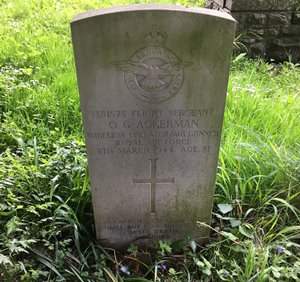
Jeannie and her baby son survived the war, and later were invited to go and live in California with Oscar’s aunt Amelia, where he was spared the austerity of life in Britain.
Barbara Jean eventually returned to Glamorganshire, and remarried in 1960. She and her 2nd husband lived in a village called St Hilary just a few miles from St Brides. She passed away in 2017, aged 93.
This account of Oscar Ackerman’s life was written by Oscar Ackerman (Junior), his son.
